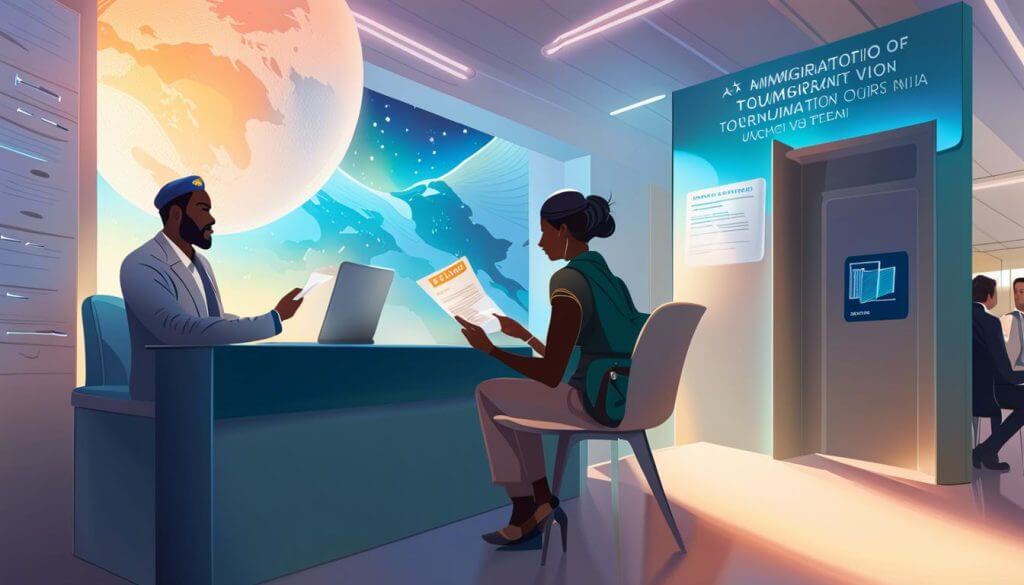Immigration can be a journey full of challenges, ups and downs, and questions. During this process, a common situation that often causes concern among immigrants is“I have a tourist visa and I have a family petition, can I fix my papers?
In this article, Jaskot Law will explore the nuances of this situation, from the initial limitation of a tourist visa to the process and important considerations when seeking a change of status. Read on and get the answer to your questions.
I have a tourist visa and I have a family petition: can I arrange papers?
The answer to this big and common question is yes, you can adjust your immigration status after entering the United States on a tourist visa. In this sense, the role of the family is fundamental to carry it out.
By family petition, it is possible to arrange papers once you have legally entered the country. For this, there are different categories and ways to obtain permanent residency. Here are the details.

Adjustment of status by family petition with a tourist visa
To change your status from tourist to immigrant, you must meet specific requirements and file an application with the USCIS, depending on the path you choose to obtain residency, in this case, through a family petition. Here are key considerations to keep in mind:
- You must wait at least 90 days before starting the procedure. If you do so before, Immigration will assume that you entered the U.S. on a tourist visa with the intention of staying in the country.
- If you are marrying or petitioning for a relative, you can initiate the process by filing a Form I-130, Petition for Alien Relative.
- If the relative is already in the U. S. and a number of visas are available, you must file Form I-485, Application to Register Permanent Residence or Adjust Status. If they are outside the U.S., they must follow the consular process.
It is important to be clear about both the path by which permanent residency will be applied for and the requirements involved. By doing so, you will ensure a positive result. If you need help, the team at Jaskot Law is ready to assist you throughout the process.
Residency application for family members: who can apply?
In addition to taking into account the aspects mentioned above, it is essential to know who can apply for residency for their family members. The options are as follows:
| Permanent Residents | They may file the petition for their spouses and for their children of any age, as long as they are unmarried. |
| U.S. Citizens | They have the possibility to file the petition for spouses, children, parents and siblings. |
The waiting time to obtain residency depends on the type of petition and the family member who applied. For the exact priority date, you can consult the Visa Bulletin, which is issued monthly by the Department of State.
Permanent residence with tourist visa and family petition: what documents do I need?
Applying for permanent residency in the United States on a family-based tourist visa is a detailed process that requires several important documents. Here is the list of those you should consider and carefully prepare for your application:
- Form I-130 (Petition for Alien Relative): This form is used by a U.S. citizen or permanent resident to sponsor a relative for permanent residence.
- Proof of sponsor’s legal status: document verifying the sponsor’s U.S. citizen or permanent resident status (e.g., naturalization certificate, green card).
- Beneficiary’s birth certificate: Official certificate showing the date and place of birth of the applicant, as well as the identity of his or her parents.
- Form I-485 (Application to Register Permanent Residence or Adjust Status): Form for a person already in the U.S. to adjust his or her status to that of a permanent resident.
- Two passport photographs of the beneficiary: Recent photographs that meet U.S. Department of State requirements for identification of the applicant.
- Form I-864 (Affidavit of Economic Sponsorship): Form that demonstrates that the sponsor has sufficient income or assets to support the beneficiary and will not become a public charge.
- Form I-693 (Medical Report and Vaccination Record): Form completed by a designated physician, certifying that the applicant has received the required immunizations and has passed a medical examination.
- Marriage certificate (for spouses): Legal document that proves the marriage between the sponsor and the beneficiary, if the request is based on a spousal relationship.
- Official Medical Examination Results: A medical report provided by a licensed physician showing that the beneficiary has completed a required medical examination.
- Criminal record or police letter (if applicable): Document issued by the corresponding police authority showing that the beneficiary does not have a criminal record.
- Proof of relationship with the sponsor: Documents such as family photos, correspondence, and others that certify the legitimate relationship between the sponsor and the beneficiary.
- Documentation of financial or employment support: Documents such as tax returns, pay stubs, or letters of employment that demonstrate the financial solvency of the sponsor.
Gathering the necessary documentation is a critical step that must be approached with care and precision. Be sure to consult official sources or seek the advice of an immigration attorney. You can count on the specialized team of Jaskot Law.

Can I use the tourist visa if my permanent residency is pending?
The feasibility of using your tourist visa while waiting for permanent residency varies. In this sense, we can distinguish two different cases in which such use may be affected by certain circumstances:
- If you entered the U.S. on a tourist visa that is still valid, and you start the process to obtain a Green Card, you can use it. Even if, after you begin the process, your I-94 stay permit expires.
- If you are outside the U.S. and a family member petitioned you, you cannot use your tourist visa while the application is pending. You will have to wait until you receive approval to adjust your immigration status to travel on an immigrant visa.
Conclusion
In conclusion, the immigration regularization process is essential for those who entered with a tourist visa. By following these steps and understanding the requirements, you will be on your way to a successful transition to a regularized immigration status.
Don’t let the complexities of the system hold you back. With the information provided by Jaskot Law, you can take the step towards a more secure and stable life in the United States. Do not hesitate to contact us if you need additional advice.
Sources
Form I-130, Petition for Alien Relative
Form I-485, Application to Register Permanent Residence or Adjust Status
Form I-864 (Affidavit of Financial Sponsorship)
Form I-693 (Medical Report and Immunization Record)
Frequently Asked Questions
How long can the change of status process take?
The time varies, but in general, it can take several months. Factors such as the workload of the authorities and the complexity of the case influence the duration. It is crucial to be prepared for possible delays.
Are there any legal risks in trying to change my visa status?
Yes, changing visa status carries legal risks. Violations of immigration laws can result in serious consequences, such as deportation. It is essential to seek legal advice before initiating the process to understand and mitigate these risks.
What are the alternatives if I am not eligible to change my tourist visa status by family petition?
If you do not meet the requirements, exploring other options is crucial. You may consider applying for a different visa, such as a work or student visa, or evaluate other legal avenues. Consulting with an immigration expert will help you find the best alternative.

